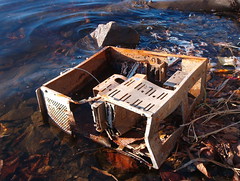Taking a little time at home last week gave me a chance to play around with one of my experiments that was nearly at its end. FlipBait is a simple Pligg/MediaWiki site that pokes fun at the dotcom golddiggers out there.

It’s mostly a sandbox for me both technically and journalistically. But it’s not really helping to inform or build community the way I hoped.
First, after a month I still have no participants. There have been several passersby, but a group publishing site needs to have a core team looking after its well being.
Second, it’s just too much work in its current form for me to keep posting to it.
I sort of expected this to happen, but I’m a big fan of experimentation. So, I thought I might analyze the issues for a few blog posts and close it down…
…but then Pligg 9 was released.
The new version of this Digg-like CMS added a key feature that may alter the dynamics of the site completely: Feed Importing.
I give it a few RSS feeds. It then imports the headlines from those feeds automatically.
Now, I have a bunch of feeds all pouring headlines into FlipBait throughout the day. I’m aggregating the usual suspects like TechCrunch and GigaOM and VentureBeat, but I also found a few sources from various searches that effectively round out the breadth of the coverage
I can find new dotcom golddiggers without fail every day.
This is very cool. Though you can see back in the Pligg forum archives that there was some debate about whether this feature would destroy the whole dynamic of voting-based publishing. That may be true, but it’s just too useful not to have.
Now, this might be the most interesting part…
I’m also importing stories from del.icio.us using a new tag: “flipbait“. That means that if you tag an article with “flipbait”, Pligg will automatically import that article and make it available to the FlipBait community. That’s how I’m entering my own favorite posts for the site as opposed to using the ‘submit’ function directly at flipbait.com.
You don’t ever have to visit the domain, actually, because you can pull articles to read from the RSS feed and submit articles to the site just by tagging as you already do.
Hmmm…what does that mean? Interesting question. Can a meaningful community form around a word that represents an idea?

